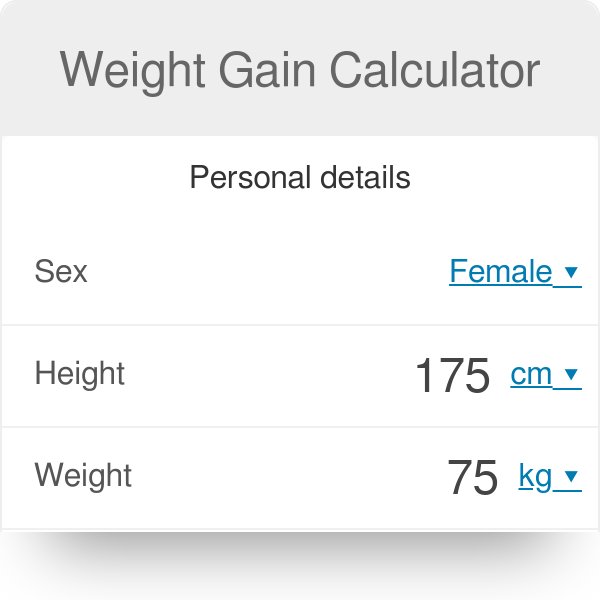In a world where many strive to shed pounds and slim down, it may seem counter-intuitive to search for ways to gain weight. However, for those seeking to build muscle, increase their strength, or simply achieve a healthier body mass, navigating the realm of weight gain can be a daunting task. That’s where this comprehensive guide on calorie intake comes in, serving as your trusted ally on the journey towards a more robust physique.
Within these pages, you will uncover the secrets of effectively consuming the right amount of calories to achieve your weight gain goals. Delving into the science behind calorie intake and muscle growth, this article will equip you with valuable knowledge and actionable steps to embark on your weight gain journey with confidence. Prepare to leave behind the confusion and frustration that often accompanies this pursuit, as we guide you towards a better understanding of how many calories you need to consume to unlock your body’s true potential.
Overview
Understanding the Importance of Calorie Intake
When it comes to gaining weight, understanding the importance of calorie intake is crucial. Calories provide your body with the energy needed to perform daily functions and support various bodily processes. Consuming an adequate amount of calories is essential for achieving weight gain goals and maintaining overall health. By understanding your personal calorie needs, you can ensure that you are consuming enough calories to support healthy weight gain.
Determining Your Personal Calorie Needs
The number of calories needed to gain weight varies from person to person. Factors such as age, gender, activity level, and metabolism all play a role in determining your personal calorie needs. To calculate your baseline, you can start by determining your Basal Metabolic Rate (BMR), which is the number of calories your body needs to maintain basic bodily functions at rest. By adding your activity level and factoring in weight gain goals, you can determine a target calorie intake that supports healthy weight gain.
Calculating Basal Metabolic Rate (BMR)
What is BMR?
Basal Metabolic Rate (BMR) is the number of calories your body needs to maintain basic bodily functions, such as breathing, circulation, and cell production, at rest. It represents the minimum number of calories your body requires to function properly. Knowing your BMR can help you determine a baseline for your calorie intake.
Factors Affecting BMR
Several factors affect your BMR, including age, gender, body composition, and genetics. Generally, younger individuals tend to have higher BMRs due to higher levels of muscle mass. Men usually have higher BMRs compared to women due to typically having more muscle mass. Body composition, specifically muscle mass, can also influence BMR as muscle burns more calories at rest than fat. Additionally, genetics can play a role in determining your BMR.
Using BMR to Estimate Calorie Needs
To estimate your daily calorie needs for weight gain, you can multiply your BMR by an activity factor. This factor takes into account your activity level throughout the day and adjusts your calorie needs accordingly. For example, if your BMR is 1500 calories and you have a sedentary lifestyle, you may multiply it by 1.2 to estimate your daily caloric needs. This calculation, however, provides an estimate and may require adjustments based on individual factors and weight gain goals.
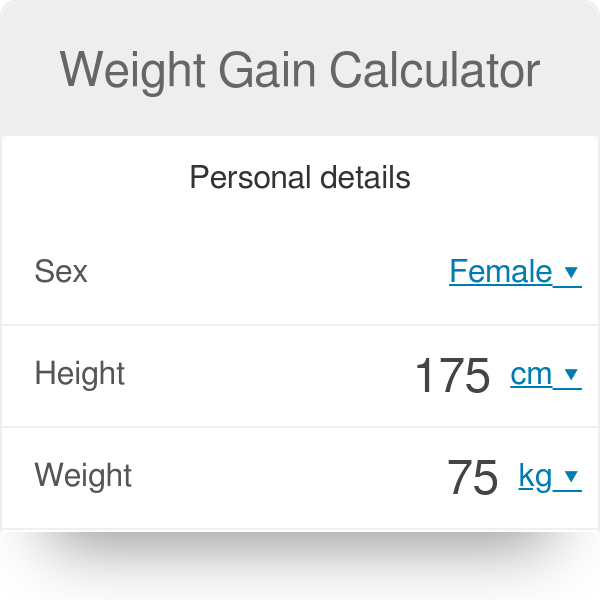
Setting Weight Gain Goals
Healthy and Realistic Weight Gain
When setting weight gain goals, it is important to aim for a healthy and realistic approach. Healthy weight gain involves gradually increasing your calorie intake to promote muscle growth and minimize fat gain. Aim to gain around 0.5 to 1 pound per week, as rapid weight gain can increase the risk of fat accumulation and health complications.
Consulting a Healthcare Professional
Before embarking on a weight gain journey, it is recommended to consult a healthcare professional, such as a registered dietitian or a doctor. They can provide valuable guidance and assistance in developing a personalized weight gain plan based on your unique needs and medical history. They can also help ensure that you are gaining weight in a safe and healthy manner.
Avoiding Rapid Weight Gain
Although it may be tempting to consume excessive calories in the hope of gaining weight quickly, rapid weight gain can have negative consequences. It can lead to an excess accumulation of fat and put additional strain on your organs. Gradual weight gain allows your body to adapt and build muscle mass while minimizing fat accumulation. It is important to focus on quality calories and make healthy food choices throughout the weight gain process.
Choosing Nutrient-Dense Foods
Importance of Nutrient Density
When selecting foods to support weight gain, it is important to prioritize nutrient-dense options. Nutrient-dense foods are rich in essential vitamins, minerals, and macronutrients, providing a wide range of health benefits. These foods contribute to overall health while supporting weight gain goals.
Protein: Building Blocks for Muscle
Protein plays a crucial role in weight gain as it provides the building blocks for muscle growth and repair. Including protein-rich foods such as lean meats, poultry, fish, eggs, dairy products, legumes, and tofu in your diet is essential. Aim for a balance of animal and plant-based proteins to ensure an adequate intake of essential amino acids.
Complex Carbohydrates: Energy Source
Complex carbohydrates are an excellent source of energy and should be included in a weight gain diet. They provide sustained energy and help fuel workouts and physical activity. Opt for whole grains, such as oats, quinoa, brown rice, and whole wheat bread, as well as fruits, vegetables, and legumes.
Healthy Fats: Calorie Dense Options
Incorporating healthy fats into your diet can help increase calorie consumption without compromising overall health. Healthy fats can be found in avocados, nuts, seeds, nut butter, olive oil, coconut oil, and fatty fish like salmon. These fats provide essential fatty acids, support brain health, and help absorb fat-soluble vitamins.
Vitamins and Minerals: Supporting Overall Health
Focusing on a balanced and varied diet rich in fruits and vegetables ensures an adequate intake of essential vitamins and minerals. These nutrients support overall health, enhance immune function, and aid in recovery from workouts. Include a wide variety of colorful fruits and vegetables to maximize nutrient intake.
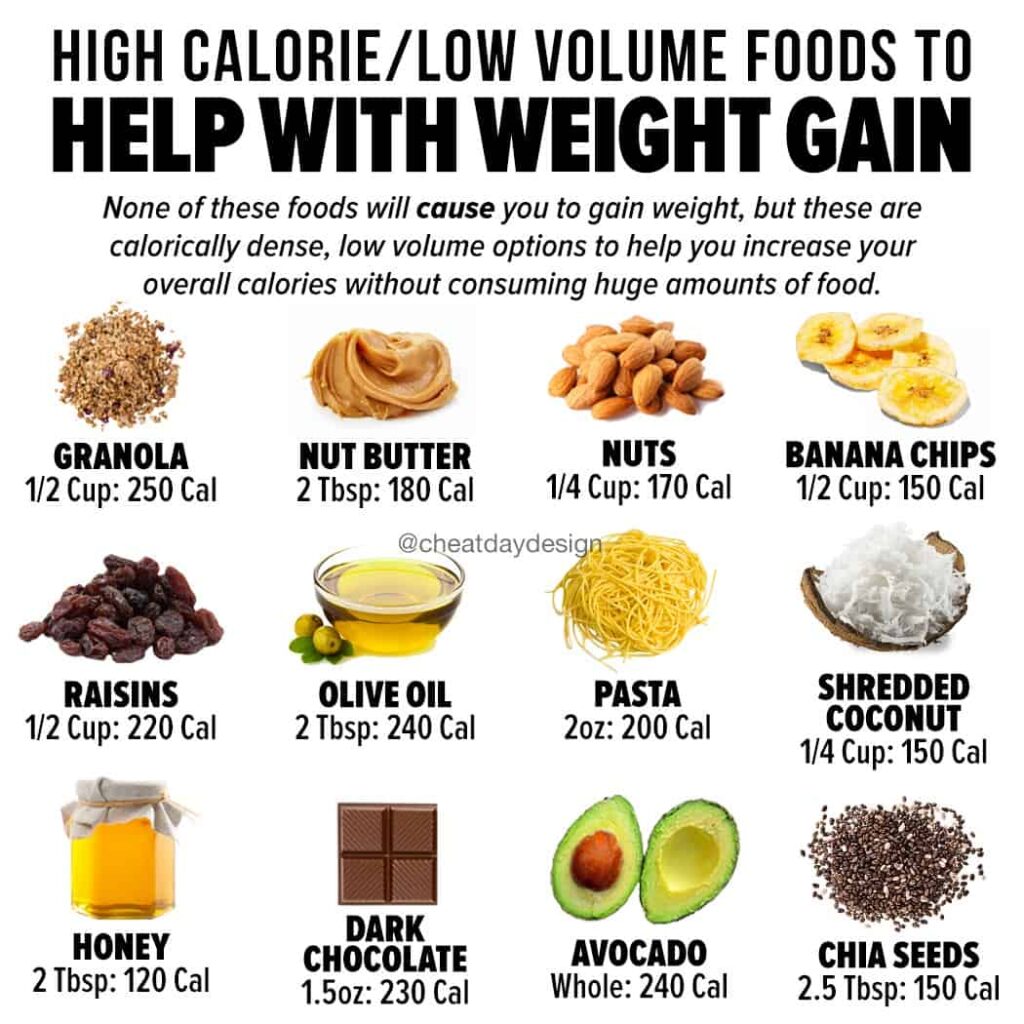
Increasing Caloric Intake
Gradual Calorie Increase
To support weight gain, it is important to gradually increase your calorie intake. Rapidly increasing calories may lead to digestive discomfort and make it challenging to maintain healthy weight gain. Aim to increase your calorie intake by 250-500 calories per day, slowly working your way up to your target calorie goal.
Small Frequent Meals
Instead of focusing solely on three large meals per day, consider consuming smaller, more frequent meals throughout the day. This approach can help ensure a continuous supply of nutrients and calories to support weight gain. Aim for 5-6 meals/snacks evenly spaced throughout the day.
Calorie-Dense Snacks
Incorporating calorie-dense snacks into your diet is an effective way to boost your calorie intake. Foods such as nuts, seeds, trail mix, granola bars, dried fruits, and energy bars are all excellent options. Including these snacks between meals can contribute to achieving your daily calorie goals.
Adding Healthy Calorie Boosters
To increase your calorie intake, consider adding healthy calorie boosters to your meals. Examples include drizzling olive oil or nut butter on salads or adding avocado to sandwiches and wraps. These additions not only increase calorie content but also add flavor and nutritional value to your meals.
Monitoring Portion Sizes
While increasing your calorie intake, it is important to monitor portion sizes to avoid excessive weight gain. Aim for balanced meals and use portion control techniques such as measuring food with kitchen scales or using a visual portion size estimation method. This will help you maintain a healthy diet while reaching your weight gain goals.
Meal Planning Tips
Balanced Meals
When planning your meals, focus on incorporating a balance of macronutrients – carbohydrates, proteins, and fats. This ensures that you are providing your body with a variety of nutrients necessary for healthy weight gain. Include lean proteins, whole grains, fruits, vegetables, and healthy fats in each meal.
Pre and Post-Workout Nutrition
To optimize your workouts and support muscle growth, pay attention to your pre and post-workout nutrition. Consume a balanced meal or snack containing carbohydrates and protein about 1-2 hours before exercising to provide fuel for your workout. After exercising, refuel with a combination of carbohydrates and protein to aid in muscle recovery and repair.
Meal Prepping for Convenience
Meal prepping can be a helpful strategy in ensuring that you have access to nutritious meals throughout the week. By preparing and portioning your meals in advance, you can save time, promote portion control, and make healthier choices. Invest in storage containers and plan your meals for the week ahead.
Mindful Eating
Practicing mindful eating can enhance your enjoyment of food and help you maintain a healthy relationship with eating. Slow down, savor each bite, and pay attention to your body’s hunger and fullness signals. Avoid distractions while eating, such as watching TV or using electronic devices, as these can lead to mindless overeating.
Cooking Techniques to Boost Caloric Content
Utilize cooking techniques that can help increase the caloric content of your meals. For example, adding oils, butter, or sauces to your dishes can add calories without significantly increasing portion sizes. Sautéing vegetables in olive oil or adding a drizzle of honey to your meals can enhance flavor and increase calorie density.
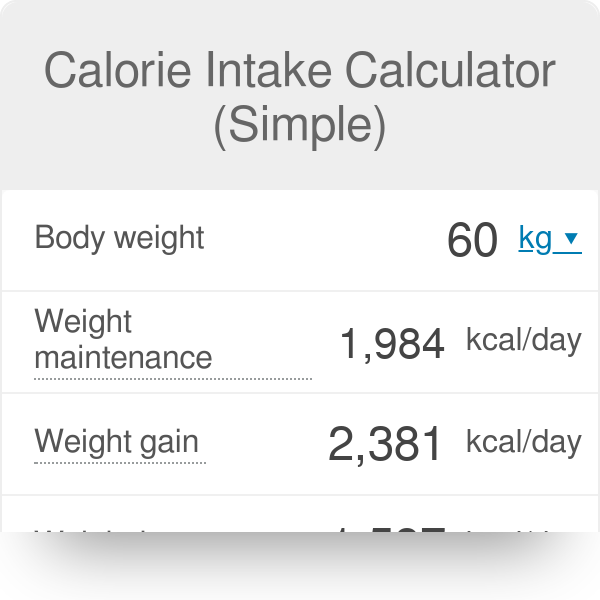
Strength Training for Weight Gain
Importance of Resistance Training
Incorporating strength training exercises into your routine is crucial for healthy weight gain. Strength training helps stimulate muscle growth and development, leading to increased muscle mass. The more muscle you have, the higher your basal metabolic rate, which can support weight gain.
Compound Exercises for Muscle Development
Compound exercises, which involve multiple muscle groups, are particularly effective for muscle development. These exercises include squats, deadlifts, bench presses, and pull-ups. By performing compound exercises, you engage multiple muscles simultaneously, maximizing the growth potential of your workouts.
Modifying Repetitions and Sets
To optimize muscle growth, it is important to adjust the number of repetitions and sets in your workouts. Typically, performing 8-12 repetitions per set with moderate to heavy weights is recommended for muscle hypertrophy. Gradually increase the weights and adjust the sets accordingly as you progress.
Tracking Progress and Adjusting Intensity
To ensure continuous progress, it is important to track your workouts and make adjustments as needed. Keep a record of the weights you are lifting, the number of sets and repetitions performed, and how you feel during and after each workout. Adjust the intensity of your workouts by gradually increasing weights or modifying exercises to maintain progress.
Supplements to Aid Weight Gain
Consultation with a Healthcare Professional
Before considering any supplements for weight gain, it is crucial to consult with a healthcare professional. They can assess your individual needs and evaluate any potential risks or interactions with existing medications or medical conditions. A healthcare professional can provide personalized recommendations and ensure safe and effective supplementation.
Protein Powders and Shakes
Protein powders and shakes can be a convenient way to supplement your diet with additional protein. They provide a concentrated source of protein that can help meet your daily protein requirements for muscle growth. Choose a high-quality protein powder that suits your dietary preferences and consult with a healthcare professional for guidance.
Weight Gainers and Meal Replacements
Weight gainers and meal replacement products can be used to supplement calories, especially for individuals with high caloric needs or difficulty consuming large volumes of food. These products typically provide a mix of protein, carbohydrates, and fats to support weight gain. Consult with a healthcare professional to determine if these products are suitable for you.
Essential Nutrient Supplements
In some cases, certain essential nutrients, such as vitamins or minerals, may be lacking in your diet. Supplementing with specific nutrients can ensure that you are meeting your nutritional needs and supporting overall health. However, it is important to consult with a healthcare professional to determine if supplementation is necessary and safe for you.
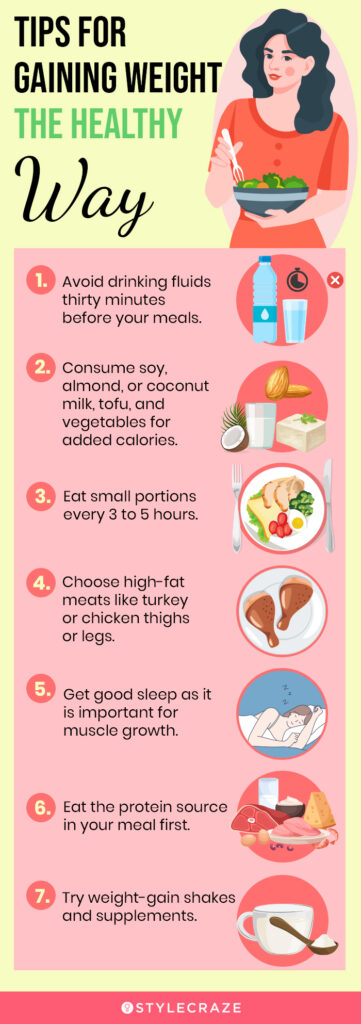
Healthy Lifestyle Habits
Adequate Sleep and Rest
Adequate sleep and rest are essential for optimal health and weight gain. During sleep, your body repairs and recovers, and adequate rest is necessary for muscle growth. Aim for 7-9 hours of quality sleep per night and incorporate rest days into your workout routine to allow your muscles to recover.
Stress Management
Chronic stress can interfere with weight gain efforts and overall health. High levels of stress can lead to loss of appetite and affect digestion, making it difficult to consume enough calories. Practice stress management techniques such as deep breathing exercises, meditation, or engaging in activities that promote relaxation.
Hydration
Staying hydrated is important for optimal health and can support weight gain efforts. Water is involved in numerous cellular processes and aids in digestion and nutrient absorption. Aim to drink at least 8 glasses of water per day and adjust intake based on activity level and individual hydration needs.
Regular Physical Activity
While it may seem counterintuitive, regular physical activity is still important even when trying to gain weight. Exercise can help stimulate appetite, support muscle growth, and improve overall health. Incorporate moderate-intensity activities, such as walking or cycling, into your routine to enhance your fitness and well-being.
Avoidance of Smoking and Excessive Alcohol Consumption
Smoking and excessive alcohol consumption can have detrimental effects on your health and hinder weight gain efforts. Smoking is known to suppress appetite and can negatively impact overall health. Excessive alcohol consumption provides empty calories and can interfere with nutrient absorption and muscle recovery. It is best to avoid these habits to support healthy weight gain.
Monitoring and Adjusting
Keeping a Food Journal
Keeping a food journal can be a helpful tool in monitoring your calorie intake and tracking your progress. By recording what you eat and drink throughout the day, you can become more aware of your eating habits and identify areas where adjustments may be needed.
Tracking Weight and Body Measurements
Tracking your weight and body measurements regularly can provide valuable insights into your progress. Regular weigh-ins and body measurements can help you determine if you are gaining weight at a healthy rate and whether adjustments to your diet or exercise routine are necessary.
Evaluating Progress and Making Adjustments
Regularly evaluate your progress by comparing your weight and measurements over time. If you are not gaining weight as desired or you are gaining weight too rapidly, it may be necessary to make adjustments to your calorie intake or exercise routine. Consulting with a healthcare professional or registered dietitian can provide guidance on making appropriate adjustments.
Seeking Professional Guidance
If you are struggling to gain weight or have specific health conditions that require a personalized approach, seeking professional guidance is highly recommended. A healthcare professional or registered dietitian can provide specific advice tailored to your needs, address any concerns, and develop a customized plan to support your weight gain goals.
By incorporating these strategies into your lifestyle and being consistent with your efforts, you can successfully achieve healthy weight gain. Remember that it is essential to prioritize your overall health and well-being throughout the process.
